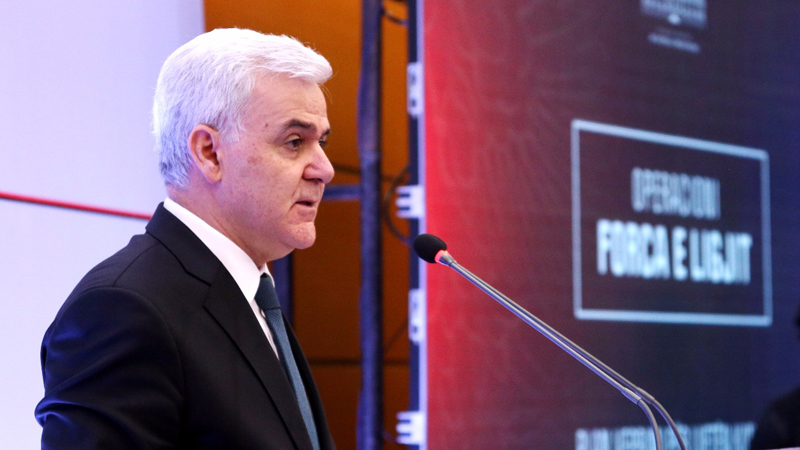
Fatmir Xhafaj has decided to remain Minister of Interior Affairs. He declared as much today, in a long press statement, filled with the same accusations and proclamations of Xhafaj as a hero of the public interest, bravely weathering the attacks of those who are terrified of the justice he brings.
Beyond the stale propaganda and repetition of the same tune that Albanian politicians have been playing for the last 30 years every time they are accused of anything, one can easily notice two indicators of the legal and political mentality that makes Xhafaj unfit to be Minister of Interior Affairs and a key figure in the execution of the Justice Reform.
Xhafaj justified his decision not to resign by asserting that he had broken no laws. In his speech to the wider public, he stated:
And in this context, is there someone who can tell me, and the citizens, exactly which law have I broken, either, today, as Minister of Interior Affairs, or any other time I held public office?
It seems that what Xhafaj doesn’t understand, or pretends not to understand, is that it is not the citizens, or anyone else, that determines what laws he has broken and what he is guilty of, but the judiciary system. That is the foundation of the rule of law, and, most importantly, the aim of the Justice Reform Xhafaj spearheaded.
So, to answer the Minister’s question to us, the citizens, Xhafaj would have to be investigated and judged by the judiciary.
We, as citizens, have the right to say or suspect that Xhafaj may have broken the law. That is precisely what the media and the opposition have demonstrated via tangible, credible evidence that Xhafaj needs to obey the antimafia law, which means that his wealth needs to be investigated, in the same way that Xhafaj has bragged of investigating and confiscating the wealth of several drug traffickers and their families in the few last months.
Furthermore, the media and the opposition have shown that Xhafaj’s brother, though convicted by the Italian courts, inexplicably, has never been a wanted person, neither in Italy nor Albania, while the rest of his gang has been placed on international wanted persons lists.
Under these circumstances, it is only rational to suspect that perhaps Xhafaj, having been Minister of Justice in 2002 and responsible for signing and executing the extradition agreement in Italy, may have used his influence to arrange for his brother to claim that he would carry out the sentence of the Italian courts in Albania. This reasonable doubt should be considered and investigated.
So, there are at least two reasons why Xhafaj must undergo investigation. This investigation will not mean he is guilty. on the contrary, as the co-author of the Justice Reform, EU ambassador Romana Vlahutin, put it a few days ago, it must be carried out under presumption of innocence.
However, in order that the investigation be impartial and fair, Xhafaj needs to resign, as it is not believable that his subordinates would unbiased while investigating their superior – the court police, responsible for investigating on the behalf of the Prosecution Office, is part of the Ministry of Interior Affairs.
In his public speech, today, Xhafaj also took a very problematic stance. He spoke to his friends, who he said had supported him during the last few days, saying:
The political caste of the mud is unable to do anything but concern themselves with what one’s brother, sister, mother, father, spouse, or children do…
My friends, do not expect me to start with the spouses, daughters, sons, sisters, brothers, or siblings-in-law of some of these shameless people that have attacked me these days, even though there is a lot to be said and done in that respect.
Ironically enough, Xhafaj was the one to put into law the practice of inspecting sons, daughters, sisters and brothers. Even many-times removed cousins. All prosecutors, judges, legal assistants, and, lately, police officers, have to answer for all of the aforementioned, per the vetting laws. The career of any one of them is over the moment it is proven that they may have had any connection to distant cousins involved in any criminal activities.
In practicing the above laws, the vetting officers, seemingly embracing the methods of communist investigators, have begun traumatizing minors by showing up to their schools and interrogating them without the parents’ knowledge, consent, or presence, going so far as to check the kind of clothes the children are wearing.
The opposition asked Xhafaj, when he spoke for the vetting of police officers, to start with himself, but he refused. Now that he is being vetted, so to speak, by the public opinion, he feels violated.
It is ironic that the “father” of the Justice Reform is refusing to leave his position over a criminal family connection closer than what the vetting law he drafted would allow anyone else.
Finally, as a politician, Xhafaj must know that he has a duty to respect ethical and moral standards to the interest of the public.
The war against crime and corruption has no place for people of ambiguous and fuzzy morals. The Justice Reform needs persons with high moral standards. Xhafaj can no longer claim to be such a person, and he can no longer continue to occupy a key position in the country’s law enforcement system.
The man yelling about politicians being afraid of a ruthless and blind Justice Reform, may end up being, himself, a test of the objectivity and impartiality of this reformed justice.
Fatmir Xhafaj has a right to continue living, unimpeded, as an honest citizen, provided that it is proven that he has broken no laws. He may even be a lawmaker. However, as long as the law demands he be investigated upon reasonable doubt, Fatmir Xhafaj can no longer be the key figure of Albania’s law enforcement.

